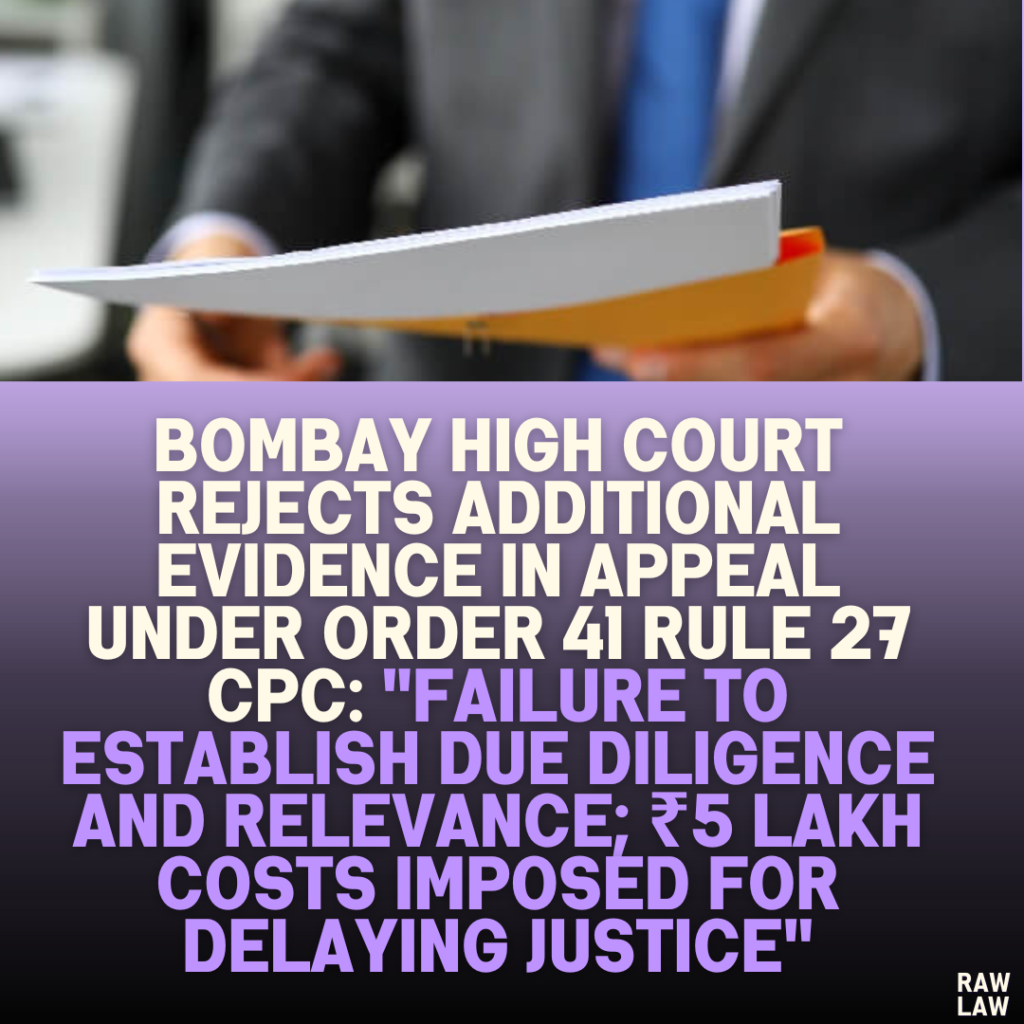Court’s Decision:
The Bombay High Court dismissed the appellants’ Chamber Summons seeking to introduce additional evidence under Order 41 Rule 27(1)(aa) of the Code of Civil Procedure (CPC). It ruled that the request was unjustified, amounted to an abuse of judicial process, and was intended to delay the adjudication of the appeal. The court imposed costs of ₹5,00,000 on the appellants, to be paid to the respondents within two weeks.
Facts:
The dispute arose from a suit for specific performance of an agreement to sell property. The appellants, trustees of a trust, had entered into an agreement with the respondents, a partnership firm, for the sale of property. The trial court decreed the suit in favor of the respondents, holding them entitled to specific performance. The appellants filed an appeal against this decision.
During the appellate proceedings, the appellants sought to introduce a Joint Development Agreement (JDA) as additional evidence. They argued that the JDA demonstrated the respondents’ lack of possession over the disputed property, a fact they claimed was suppressed during the trial. The appellants contended that despite exercising due diligence, they could not produce the JDA earlier as its existence was unknown to them.
Issues:
- Can the JDA be admitted as additional evidence under Order 41 Rule 27(1)(aa) of the CPC?
- Is the evidence relevant and necessary for adjudicating the appeal?
Petitioner’s Arguments:
- Suppression of Evidence: The appellants claimed that the respondents intentionally suppressed the JDA, which was within their exclusive knowledge.
- Due Diligence: They argued that the JDA could not have been discovered earlier despite reasonable efforts, fulfilling the requirements of Order 41 Rule 27(1)(aa).
- Impact on Outcome: They asserted that the JDA would have altered the trial court’s findings on possession, a key issue in the suit for specific performance.
- Mandatory Admission: The appellants maintained that once the conditions of Order 41 Rule 27(1)(aa) were satisfied, the court was obligated to admit the evidence before proceeding with the appeal.
Respondent’s Arguments:
- Relevance of Possession: The respondents argued that possession was ancillary and not central to the grant of specific performance under the Transfer of Property Act, 1882. They emphasized that the decree was based on full payment of consideration and other critical factors, not merely possession.
- Lack of Due Diligence: They contended that the appellants failed to demonstrate why the JDA was not discovered earlier and argued that it was publicly available, undermining the claim of due diligence.
- Discretionary Nature of Order 41 Rule 27: The respondents pointed out that admitting additional evidence at the appellate stage is discretionary, not a matter of right. The appellants’ failure to meet the stringent requirements of the rule disqualified their application.
- Delaying Tactics: The respondents accused the appellants of using the Chamber Summons as a tactic to delay the execution of the trial court’s decree, depriving them of their rights under the judgment.
Analysis of the Law:
- Order 41 Rule 27 of the CPC: This rule restricts the admission of additional evidence at the appellate stage except under specific circumstances:
- If the trial court refused evidence that should have been admitted (Rule 27(1)(a)).
- If, despite due diligence, the evidence could not be presented earlier (Rule 27(1)(aa)).
- If the appellate court requires the evidence to pronounce judgment (Rule 27(1)(b)).
- Discretionary Nature: The court underscored that Rule 27 grants discretion to admit additional evidence only if it is critical for resolving the appeal. The appellants must not only satisfy the rule’s conditions but also demonstrate that the evidence is indispensable.
Precedent Analysis:
- Hasanate Taheriyyah Fidayyiah v. Mahesh Saran: This case affirmed that appellate courts could consider applications under Order 41 Rule 27 before or during the appeal, based on the case’s facts. However, it emphasized that the discretion lies with the court.
- Union of India v. Ibrahim Uddin: The Supreme Court held that the admission of additional evidence must be exceptional and cannot be used to delay proceedings.
- Ferani Hotels Pvt. Ltd. v. Nusli Wadia: This precedent clarified that failure to exercise due diligence during the trial precludes parties from introducing evidence at the appellate stage.
Court’s Reasoning:
- Due Diligence Not Established: The court held that the appellants failed to demonstrate why the JDA could not have been discovered earlier. It observed that the JDA was a public document and should have been accessible during the trial.
- Relevance to Specific Performance: The court agreed with the respondents that possession was not central to granting specific performance. The trial court had considered other decisive factors, such as payment of consideration and control over the property, rendering the JDA inconsequential.
- Delay and Abuse of Process: The court noted that the Chamber Summons was filed over two years after the appeal and eight years after the trial court’s decree. It found this indicative of a deliberate attempt to delay proceedings and undermine the respondents’ rights.
- Discretionary Power: The court emphasized that admitting additional evidence at the appellate stage is not mandatory, even if the rule’s conditions are met. It highlighted the potential misuse of this provision to prolong litigation.
Conclusion:
The court dismissed the Chamber Summons, holding that the appellants failed to meet the stringent requirements for admitting additional evidence under Order 41 Rule 27. It imposed costs of ₹5,00,000 on the appellants to deter similar conduct in the future.
Implications:
This judgment reinforces the principles governing the admission of additional evidence at the appellate stage, emphasizing the need for due diligence and the exceptional nature of such applications. It underscores the discretionary power of appellate courts and seeks to prevent the misuse of procedural provisions to delay justice. The decision serves as a warning against frivolous and dilatory tactics in litigation.



